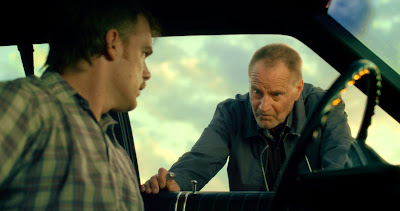by Tony Dayoub
A couple of movies, just out in these past few weeks, are worth considering for the way they justify anachronistic masculine concerns with their simple, respective applications of period setting. The Rover is set in the near future, in a world where an unexplained (though I believe the reason is strongly implied) lack of women contributes to the macho aesthetic. Cold in July has it far easier, taking place nearly 30 years ago in Texas where gender equality was not unheard of but definitely slower in getting a foothold.
The latter, adapted from a crime novel by Joe Lansdale, can feel obvious at times. Frame store owner Richard Dane (Michael C. Hall) finds himself caught in an epic setup himself (get it?) after killing an unarmed burglar in his home. But that's probably more of a mordant barb in what is an otherwise exceedingly grim movie. A few unexpected twists later, Dane is working with ex-con Ben Russell (Sam Shepard) and his flamboyant war buddy, Jim Bob Luke (Don Johnson in a breath-of-fresh-air, show-stealing turn) to discover the truth behind the seemingly innocuous home invasion that links Richard and Ben.
What we get in Cold in July is a dark, Texas neo-noir that involves snuff films, family ties, and three men who each assert their own influence on the notions behind what it takes to be a "real" man. Old codger Ben is the ruthless, taciturn type, something which ultimately may not have done his progeny any good as the movie demonstrates. Jim Bob is the peacock, his showy strut disguising an accurate judge of character. And Richard is the contemporary, sensitive family man who finds hidden reserves of bravery in that place of decency that compels him to delve deeper into the mystery behind what initially set him and Ben against each other. Director Jim Mickle grants himself an endless free range in which to explore Hawksian notions of manhood and camaraderie by way of Jeff Grace's synth score, deliberately evocative of the compositions of 80s-era Howard Hawks disciple, John Carpenter.
Belying its blown-out brightness, The Rover is even more ruthless a film, set in Australia a number of years after The Collapse. We enter a Mad Max-like netherworld where petrol is worth far more than the meaningless paper that constitutes money. There we meet Eric (Guy Pearce), a man as lost as Max Rockatansky at the conclusion of the George Miller science fiction film that inspired director David Michôd. Not even a car tumbling end over end outside the bar where he sits is enough to awaken Eric from his drunken reverie. But when that wreck's shady occupants, led by Henry (Scoot McNairy) steal Eric's vehicle, it stirs him enough to go on an inexorable pursuit through crumbling post-apocalyptic towns with his quarry's brother, hostage-cum-partner Rey (Robert Pattinson).
Only the most pragmatic or addled women have avoided being victimized from men who all seem to be marking time... for what? A running gag through the film involving the premium placed on American dollars over Australian money. But where would one spend it, and how would one get there to do so? There's also an undercurrent of Asian xenophobia reflecting Australians' fears of being dragged onto a Pacific alliance replete with uneasy alliances. The only authorities in evidence are armed national guards guarding trains (likely carrying oil) stamped with mysterious Asian corporate symbols. We become aware of how askew this world really is when Eric is simply arrested for vagrancy and is virtually ignored for confessing an earlier, significantly higher, moral crime.
The Rover homes in on the cynical Eric and his not-so-bright travelling buddy Rey because both share one thing in common that appears to have escaped everyone else in the film. They are both aware enough to recognize the slow erosion of their own morality. For all of their macho bravado as they front for the antagonists they encounter, each in their own way is clinging desperately to what little there is that still makes them human as a pair of precisely placed pop tunes prove. The Rover's pat, sentimental coda notwithstanding, there's a rich, multi-layered inquiry into machismo, both real-life and movie-related, worth burrowing into here.







No comments:
Post a Comment